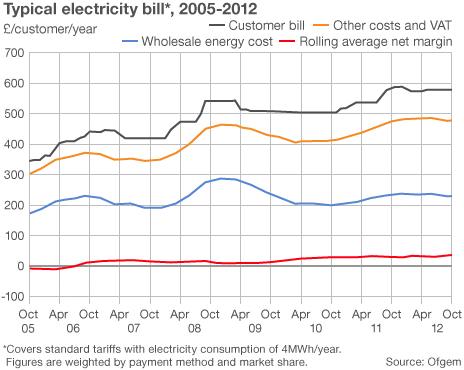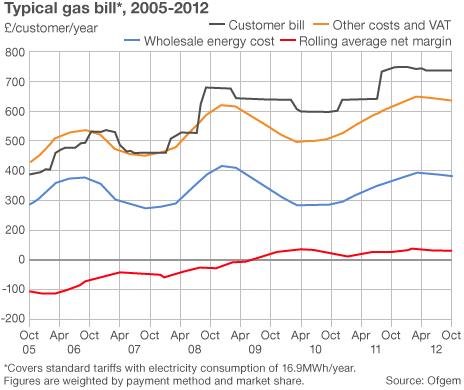David Cameron stands by 'lowest' energy tariff vow
- Published
- comments
David Cameron: ''I want to be on the side of hard pressed, hard working families who often struggle to pay energy bills''
David Cameron has insisted energy firms will be compelled to give customers "the lowest tariff" as he sought to clear up confusion over energy policy.
The exact details of how this will be achieved, in next month's Energy Bill, have yet to be decided.
But Downing Street claims consumer groups and energy firms SSE and Ovo support the policy.
Some business groups warn it could damage competition and even lead to higher prices.
It comes after 24 hours of apparent confusion over where the government stands, with Labour accusing ministers of throwing energy policy into "chaos".
During Prime Minister's Questions on Wednesday, Mr Cameron made a surprise announcement promising to legislate "so that energy companies have to give the lowest tariff to their customers".
The main energy firms said they knew nothing of the plan - or of the government's intention to put it into legislation.
Energy Secretary Ed Davey appeared to distance himself from the proposal and Downing Street said energy firms would be obliged only to "offer" the cheapest tariffs.
Energy minister John Hayes, summoned to the Commons to clear up the confusion, said a number of options were being considered.
These included an evaluation of whether voluntary agreements made by the energy companies in April should be "made binding" through legislation.
"This is a complicated area and we will discuss with the industry, consumer groups and the regulator in order to work through the detail," Mr Hayes said.
But arriving for an EU summit in Brussels, Mr Cameron stood by his remarks, telling reporters: "I want to be on the side of hard-pressed hard-working families who often struggle to pay energy bills.
"That's why I said in the House of Commons yesterday we're going to use the forthcoming legislation - the Energy Bill coming up this year - so that we ensure that customers get the lowest tariffs."
In his statement to MPs, Mr Hayes said the government needed a "robust" relationship with the six big energy firms and would take the "necessary steps to ensure people get the best possible deal".
Shadow energy secretary Caroline Flint said Mr Cameron had thrown energy policy into "confusion", causing "chaos" in the energy industry.

Angela Knight, chief executive of the Energy UK - the trade association for the energy sector - told BBC News the industry had been taken by surprise by the PM's announcement and more clarity was needed on the government's position.
She said the industry had already made progress by introducing "easily understandable tariffs, much fewer tariffs and assisting people as to how they can find out exactly which one is suitable for them".
Business groups warned forcing companies to give customers the cheapest tariffs could damage competition in the market.
Deputy director general of the CBI Neil Bentley said "scare stories" about the government's commitment to the energy market could "create a lot more uncertainty for companies looking to invest in the UK".
But consumer group Which? urged Mr Cameron to "stick to the promise" he made in Parliament.
"Just giving people information on the lowest tariff is not enough when trust is at an all-time low in the industry and switching levels are falling," Which? said.
Greenpeace said the government's energy policy was now "as confusing as British Gas tariffs" and the UK needed to do more to reduce its reliance on gas.
Under this voluntary arrangement the six main energy providers agreed to contact customers once a year to tell them what the best tariff is for them, and how to get it and to contact customers coming to the end of a fixed-term contract with the same advice.

- Published18 October 2012
- Published12 October 2012